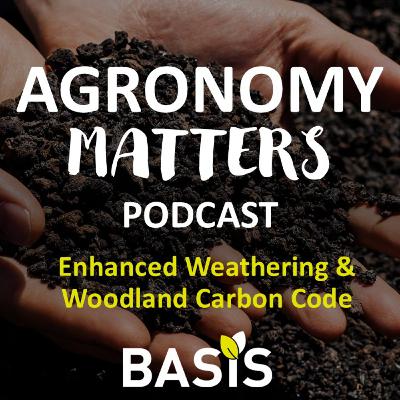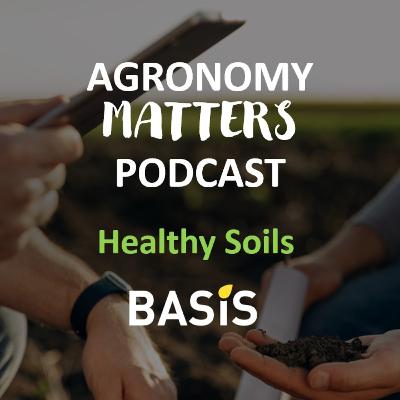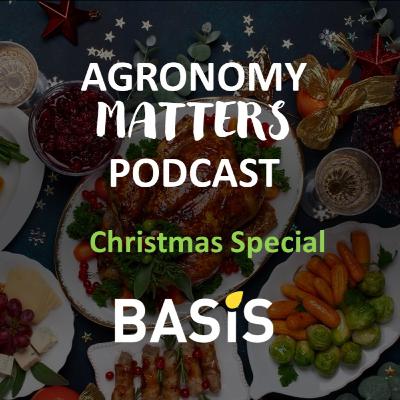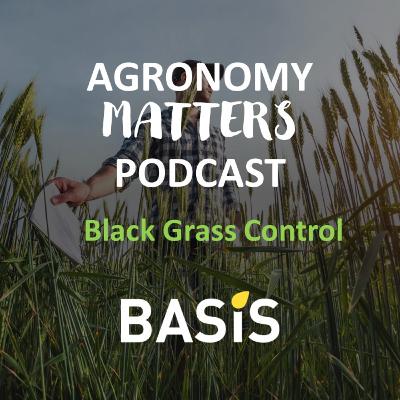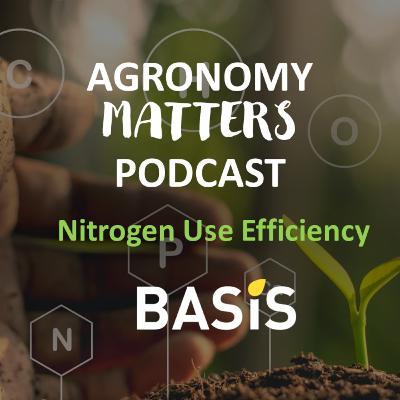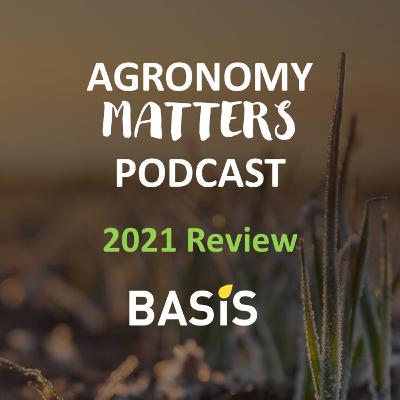Discover BASIS Agronomy Matters
BASIS Agronomy Matters

45 Episodes
Reverse
Welcome to another episode of Agronomy Matters! Hosted by Thomas Vaughan, Commercial Manager for BASIS, this episode dives into two topics in sustainable agriculture and carbon management:
Enhanced Weathering: Featuring Jez Wardman, Chief Agronomist at UNDO. Jez shares insights into the innovative practice of spreading basalt rock dust on agricultural land to capture carbon and improve soil health. We’ll explore the science behind this approach, the outcomes of trials conducted with Newcastle University, and the potential economic and environmental benefits for farmers.
Woodland Creation and Carbon Finance: With Emma Stewart from the Woodland Carbon Code. Emma explains how landowners can contribute to the UK’s climate goals while generating income. We discuss project eligibility, the concept of "additionality," and why Woodland Carbon Units (WCUs) are a trusted option for high-quality carbon offsets.
Whether you are a farmer, a land manager, or simply interested in sustainability, this episode offers practical advice and forward-thinking ideas to help tackle climate change. BASIS Courses:
In-person Carbon and Greenhouse Gases certificate, accredited by Harper Adams University.
Online Principles of Carbon and Greenhouse Gases course on the BASIS Classroom. Details at basis-reg.co.uk.
In this episode of Agronomy Matters, listeners are invited
on an exploratory journey into the future of farming with two distinguished guests.
As the UK embraces the potential of drone technology across various sectors, including agriculture, our guests shed light on its burgeoning significance.
Rob Pearson, CEO of Autospray Systems, shares insights into the cutting-edge advancements in drone technology and its implications for agriculture.
Alongside Rob is Richard Binks, a Technical Consultant and IPM specialist, who delves into a small study exploring the viability of drones for spraying nematodes as a form of pest control.
Welcome to another episode of Agronomy Matters! In this edition, our host, Thomas Vaughan, Environment Manager for BASIS, takes listeners on a deep dive into the world of regenerative agriculture, shining a spotlight on the recently launched and crowd-funded film, "Six Inches of Soil." This insightful discussion features key figures from the film, including the producer, Claire Mackenzie, and one of its leading stars.
"Six Inches of Soil" unfolds an inspiring narrative that showcases the efforts of British farmers, communities, and entrepreneurs at the forefront of transforming our food production and consumption. The film explores agroecology, an approach embracing regenerative farming techniques harmonising with nature, and emphasises local food systems with shorter supply chains. The extensive benefits range from understanding food sources to ensuring fair prices for farmers and the production of healthy food in a sustainable environment.
This cinematic journey follows the inaugural year of regenerative farming for three new farmers—Anna Jackson, Adrienne Gordon, and Ben Thomas. As they work towards healing the soil, enhancing community provisions, and developing viable businesses, seasoned mentors and experts join them in this transformative experience. The film addresses complex issues, from the connections between food and health to questions of affordability, animal roles in farming, land ownership disparities, barriers faced by new entrant farmers, and even the ongoing debate on carbon offsetting in agriculture.
Presented with hard-hitting facts, the film provides an authentic glimpse into agroecological farming, capturing the essence of a deep connection with the land, the changing seasons, and the production of food for local communities.
Our discussion delves into how our guests got to where they are today and the challenges they faced along the way. Our first guest is Claire Mackenzie, the producer of "Six Inches of Soil," whose background spans TV production, charity fundraising, and event organising. Also joining the conversation is Ben Thomas, a livestock farmer from Cornwall, who carries out various techniques from mob grazing to agroforestry in order to improve soil health and biodiversity.
Stay tuned for a thought-provoking conversation as the layers of "Six Inches of Soil" are uncovered, and the profound impact of regenerative agriculture on our food systems and environment is explored. Welcome to Agronomy Matters!
www.basis-classroom.co.uk/courses
In this episode of Agronomy Matters, Thomas Vaughan, Environment Manager for BASIS, delves into the world of sustainable hedgerow management with our guest, Megan Gimber, Key Habitats Officer for the People's Trust for Endangered Species (PTES).
The episode kicks off with an overview of the recent updates to the Sustainable Farming Incentive (SFI) announced by the UK government in January 2024. The SFI plays a crucial role in shaping farming practices by providing government funding for actions that enhance the environment and promote sustainability. Megan, shares her best practical advice to both promote hedgerow health and wider biodiversity.
During the interview segment, Megan provides insights into various aspects of hedgerow management:
1. Introduction to Hedgerow Management: Megan explains how well-maintained hedgerows can benefit farmers and the surrounding ecosystem.
2. Species Selection and Biodiversity: She offers advice on planting and establishing hedgerows to maximise environmental benefits.
3. Erosion Control and Water Management: Considering recent wet weather, Megan discusses ways in which hedgerows contribute to better water management and erosion control.
4. Integration with Farming Practices: Megan addresses challenges and considerations for farmers when implementing hedgerow management alongside existing hedgerows.
5. Best Practices and Tips: She shares best practices for maintaining hedgerows on-farm and highlights success stories and case studies.
6. Hedgerow Trees: Megan emphasises the importance of hedgerow trees in the farm ecosystem, providing advice on species selection and planting.
7. Future Trends and Research: She touches upon emerging trends and ongoing research in hedgerow management that farmers should be aware of.
BASIS's newly launched a practical guide to hedgerow management, available online for farmers, agricultural professionals, and enthusiasts. The guide covers various aspects of hedgerow management, including benefits, funding, legislation, and practical tips.
Listeners are encouraged to visit the BASIS Classroom Store for more information on the guide and how to enrol. The episode wraps up with details on claiming a CPD point for listening and a teaser for future insightful discussions on Agronomy Matters.
www.basis-classroom.com/courses
Join, Thomas Vaughan, our Environment Manager at BASIS, as we embark on an exclusive tour of the acclaimed British Potato Show in our latest episode. Let's dive deep into the heart of potato country, exploring the highs and lows of the 2023 potato crop while uncovering the challenges and opportunities shaping the current potato industry landscape.
🥔 Fiona's Insights on Fungicide Resistance - Our first stop takes us to SAC Consulting, where Fiona delves into the critical issue of fungicide resistance. Gain valuable insights into the concerns surrounding this challenge and discover strategies to mitigate its impact on potato crops.
🌿 We visit the Fera Science stand with Damian and Callum, offering a fascinating glimpse into the intricate world of aphid samples processing. Learn about their expertise and invaluable advice on addressing nematode problems, contributing to the overall health and resilience of potato crops.
🌱 CHAP's Role in Potato Grower Support - Our exploration concludes at the CHAP stand, where Rosie enlightens us on CHAP's pivotal role in supporting potato growers. Uncover the latest projects, including the ground-breaking "de-sist" initiative, utilizing trap crops to combat nematodes and ensure a sustainable and thriving potato industry.
🚜 Special Segment with Harry Henderson - But wait, there's more! In a special segment, our Technical Manager at BASIS, Harry Henderson, provides a comprehensive update on the NRoSO training events running from 2023 to 2024.
So, whether you're a seasoned farmer or just curious about the fascinating world of agronomy, grab your favourite brew, settle in, and get ready to immerse yourself in the latest happenings from the heart of the British Potato Industry. Agronomy Matters - where every spud has a story, and every farmer has a journey! 🚜🌾
This month’s episode of Agronomy Matters is hosted by Thomas Vaughan, the recently appointed Environment Manager for BASIS. Thomas is joined by two experts who share their wealth of knowledge in soil health and environmental management.
The first guest, a previous podcast host, Jade Prince, a seasoned soil expert, now works at Farmacy, part of Hutchinson’s. Jade has been instrumental in working with BASIS, designing the course content for the new “Improving Soil Health” course series.
Jade will be sharing some of her invaluable expertise on the subject, providing practical steps that can be taken to assess and manage soil up until the end of the year.
The second guest, Teresa Meadows, the Head of Environment, Audit, and Public Affairs at BASIS, has played a pivotal role in developing the four soil series modules: “Creating a Soil Management Plan” “Increasing Soil Biology” “Improving Soil Structure” “Boosting Soil Organic Matter”
Teresa provides us with a comprehensive overview of what the courses entail, their target audience, their connections to other courses, and a tantalising glimpse into the future courses that lie ahead.
To claim 1 CPD point for listening simply email CPD@basis-reg.co.uk, and mention “BASIS Agronomy Matters Podcast: Improving Soil Health Series” along with your name and membership number.
With a view to a holistic approach to soil health, we are offering the BASIS Classroom digital modules from the “Improving Soil Health Series” for £45.00 + VAT to BASIS members and £50.00 + VAT to non-members. The whole soil series (four modules) is also available to purchase in a special bundle offer for £135.00 + VAT for BASIS members and £150.00 + VAT for non-members.
This month we have a BASIS Special as we speak to three members of the BASIS team.
We are joined by Stephen Jacob, BASIS Chief Executive Officer, Andy Brooks, Head of Education and Membership Services and Teresa Meadows, Head of Environment, Audit and Public Affairs.
Together we will review the highlights of 2022, discuss some of the upcoming challenges for the industry and talk about how BASIS will continue to support members as we move in to 2023.
We will talk about the management of the National Register of Sprayer Operators, a new addition to BASIS Registrations and we will explain how BASIS continues to develop, ensuring we keep up with an industry that is constantly changing and adapting.
Make sure you listen to the end to find out how to claim one BASIS CPD point via the members’ area on the BASIS website.
Find out more:
Principles of Sustainable Land Management
Environmental Advisers Register
NRoSO
This month we are embracing the festivities with a Christmas themed episode.
Our first guest, Andy Richardson, joins us to talk about the only vegetable that we could possibly choose to discuss at this time of year, one that divides opinion at every single Christmas dinner table, the Brussel Sprout. Andy has been an agronomist for 30 years and is the Technical Director for the Brassica Growers Association and joins us to share all his expert knowledge about this controversial veg.
No Christmas dinner would be complete without something to wash it all down, so our second guest, Graeme Brown, an independent agronomist specialising in grape vines, joins us to tell us all about the grapes behind a nice glass of bubbly.
To claim one CPD point for listening please wait for the code at the end of the episode.
Wishing you all a very Happy Christmas and New Year from the team at BASIS.
This month we are talking all about Potato Cyst Nematode, an important pest in most areas of the country where potatoes are grown.
It is during the autumn and winter months that we look to soil sample fields and prepare machinery, so on this episode we meet with three experts to learn more about sampling, controls, machinery calibration and the nematicide stewardship programme.
Our first guest is independent agronomist, Simon Alexander. Simon takes us through the 6 best practice steps to the Nematicide Stewardship Programme (NSP)from compulsory qualifications through the post application checks.
Our next speaker, Ian Foreman, joins from NSTS, the National Sprayer Testing Scheme. Ian expands on the importance of machinery calibration and best ways to avoid problems in season. You can download a check sheet here.
Finally, we are joined by David Nelson, Agronomy Director at Branston Ltd. Branston are a potato grower with sites in Lincoln, Scotland and the South West. David joins us to discuss cultural controls to PCN, with a particular focus on variety choice.
The BASIS Certificate in Crop Protection Agriculture and Vegetable courses both cover potato agronomy. If you are interested in advancing your potato knowledge further then we offer the Advanced potatoes course which also contributes towards the BASIS Diploma in Agronomy. Don’t forget we also have a module, Developing an IPM approach to PCN, available on the BASIS Classroom, created in collaboration with Bayer.
To claim you 1CPD point for listening please wait for the code at the end of the episode.
We currently have a winter offer on our BASIS Classroom digital courses (until 21st December 2022) where you can get 10% off our Principles of Sustainable Land Management course (worth 8CPD points) and the FACTS Nitrogen Use Efficiency Refresher.
This month following the launch of our Principles of Sustainable Land Management course back in May we are catching up with four experts who have completed the course to find out why they did it, what they learnt and how they will manage land more sustainability in the future.
Our first guest is Linda Bratley, Managing Director at Rural Business Services Ltd. Linda and her team offer a wide range of on farm advice from BPS to nutrient management plans and they are finding themselves becoming more involved in environmental work as new schemes continue to develop. Linda explains how the course helped to build their knowledge and prepare them for the future.
Next, we speak to Doug Townsend, a Farm Manager in the Cotswolds. Doug explains how his strong interest in sustainability encouraged him to go on the course having already completed the BASIS BETA Conservation Management course previously. Doug also tells us about joining our new BASIS Environmental Advisers Register.
Our third guest is Nina Yiannoukos, Senior Catchment Advisor at South Staffs and Cambridge Water. Nina decided to take the course as a refresher having completed the BASIS Soil and Water certificate previously and was pleased that the self-paced functionality of the course would allow it to fit around busy work and family life.
Finally, we speak to Ellie Sweetman, Forage Crop Specialist at NIAB. Ellie has a very varied role and completes the course to ensure she stays abreast of industry changes and development including how biodiversity, resource management and healthy soils are coming to the forefront and how these all integrate together. Ellie is also a member of our Register of Sheep Advisers and tells us a little more about the benefits.
If you are interested in completing the Principles of Sustainable Land Management course then you can find further information here.
https://www.basis-reg.co.uk/online-course-registration?source=podcast
Listen to the end of the podcast to claim 1 CPD point for listening.
With harvest of cereals and oilseed rape now complete across the UK, this month we talk about crop storage.
Compared to selling grain at harvest, storing grain for sale later can attract a premium. This economic incentive can mean grain is stored for long periods prior to processing. During this time the grain may be at risk from pests, fungi or moisture.
In this podcast we are joined by two guest speakers who provide us with guidance on how we can help minimise the risks to stored grain.
Our first speaker is Dhan Bhandari, Senior Cereal Product Quality Scientist at AHDB. Dhan talks to us about the best ways to monitor our grain stores, what we should be looking out for and the factors that might affect grain sampling. Our second speaker is Martin Cobbald, aka Chief Pest Geek, Managing Director at Dealey Pest Control. Martin provides some fantastic information on how we can identify and deal with pests in our stores. If you are looking for a qualified pest controller to help you then check out BASIS PROMPT our register of verified pest controllers. You can also find out more about the courses mentioned in the podcast.
Listen to the end to claim 1 CPD point for listening.
This month we talk about black grass - one of the biggest challenges to profitable arable farming in the main cereal growing areas of the UK. With its high seed production, variable dormancy and herbicide resistance, black grass has become a major headache to many farmers.
We have been forced to adapt our way of working to manage the threat of black grass competition and in this episode of Agronomy Matter we are joined by three experts who help us to understand the best methods of black grass control.
Firstly, we have Richard Hull, a research technician at Rothamsted. Richard talks to us about his current research including cultural controls. You can read more from Rothamsted Research here https://www.rothamsted.ac.uk/news/new-%E2%80%98early-warning-system%E2%80%99-finds-blackgrass-evolving-resistance-glyphosate.
Our second guest is Stuart Kevis, Business Development Manager at BASF. It is widely accepted that we need to combine non-chemical control methods with herbicides to improve overall control, so Stuart speaks about the chemical options including resistance issues.
Finally, we are joined by Paul Roche, Product Placement Lead at Syngenta, who brings it all together for us and adds a little bit about how we might incorporate the control of other problem weeds.
Weed management including both IPM and herbicide programmes are covered in depth in the BASIS Certificate in Crop Protection so if you are interested in developing your knowledge in this area, please visit our website for more details.
Health and safety is stereotypically a bit boring. Like with legislation it’s one of those topics that just comes with a bit of a yawn and a sigh, but with continued and rising concern over the high level of accidents within the agricultural industry it’s important that we, at BASIS, do what we can to support our members safety.
This month’s episode has been released early to show our support for the Yellow Wellies campaign; Farm Safety Week.
We know our BASIS members will often find themselves working on or near farm yards, working alone in fields, clambering over gates and fences and playing with soil so making sure that we are all aware of our surroundings, looking out for ourselves and others should be a top priority.
We are privileged to have been joined by 5 speakers keen to share their top tips for staying safe on farm:
Stephanie Berkely, Manager at the Farm Safety Foundation aka Yellow Wellies
Tom Price, Farm Safety and Transport Adviser at the NFU
Christopher Maher, HM Inspector HSE
Eve Macready Jones, HM Inspector HSE
Stephen Britton, HM Inspector HSE
Our speakers take us through some of the top risks our BASIS members are likely to come across and how they can help themselves and others to stay safe.
Please listen through to the end of the podcast to find out how to collect a CPD point for listening.
This month’s episode of the Agronomy Matters Podcast focuses on Nitrogen Use Efficiency (NUE). Nitrogen use efficiency has become a bit of buzz word recently but can be regarded as something that is not easy to define so this podcast aims to help listeners improve their understanding of nitrogen use efficiency and explain how we can use it to help improve our nutrient management in the future.
Nitrogen Use Efficiency has always been important but with unsteady and unpredictable fertiliser prices and changing agri-environment schemes it is becoming ever more relevant. It is for these reasons that NUE is also the topic for this year’s FACTS online assessment.
The FACTS online assessment is completed by all BASIS FACTS Qualified Advisers annually as part of their continued development. The content of this podcast should provide some of the knowledge needed before our members complete the FACTS Online assessment and provides a brilliant insight to the efficient use of nitrogen.
We are joined by three brilliant guests on this podcast….
If you are not already FACTS qualified and this is something you are interested in then please do visit our website www.basis-reg.co.uk or contact me jade.prince@basis-reg.co.uk for more information.
Make sure you listen to the end of the episode to find out how to claim one BASIS CPD point via the members area on the BASIS website.
The removal of the Basic Payment Scheme and introduction of the new Environmental Land Management Schemes (ELMS) is one of the most significant changes to UK agriculture in a generation. There are three new schemes being introduced over the new few years, starting with the Sustainable Farming Incentive, with applications opening to all farmers and land managers later in 2022.
During this episode of the Agronomy Matters podcast we hear from two speakers who can explain a bit more about what these schemes are all about, how it will impact UK agriculture and what opportunities it will provide for farmers and land managers:
Tom Lewis, who works at Defra as part of the team developing the Environmental Land Management Schemes, outlines what Defra are trying to achieve through ELMS and how it will help farmers produce food and enhance the wider environment at the same time.
Teresa Meadows, Head of Environment, Audit and Public Affairs highlights what BASIS are doing to provide training and professional development opportunities focussed on environmental management and sustainable farming practices.
Make sure you listen to the end of the episode to find out how to claim one BASIS CPD point for listening.
Click here to see more information on the NEW Principles of Sustainable Land Management Course Information
With the return of LAMMA, the UK’s leading agricultural machinery, equipment and technology show, on the 4th and 5th May, we thought we would focus this month’s episode of the Agronomy Matters podcast on cultivations.
Net zero is a current hot topic and there is no doubt that reducing cultivations can be a factor in cutting carbon dioxide emissions and increasing sequestration in the soil but what are the benefits of cultivations, and when and why should cultivations be used. Well on this episode of agronomy matters we have three experts to shed some more light on the importance of cultivations.
- David Purdy, a territory business manager for John Deere. David has over 35 years’ experience in the agricultural machinery industry and tells us about the role cultivations still have in agriculture.
- Philip Wright, an independent soil consultant with a wealth of experience in soil structure and the impact of cultivation methods.
- Glenn Bootman, joins us from HE-VA where he is both Territory Manager for South Central England and Product Manager. Having been involved with the farm machinery sector for almost 30 years Glenn focusses on how we can choose and optimise machinery use.
Make sure you listen to the end of the episode to find out how to claim one BASIS CPD point via the members area on the BASIS website.
For this month’s episode of the Agronomy Matters podcast, we are focussing on Regenerative Agriculture.
We were joined by Joe Stanley, the author of Farm to Fork, which was chosen by our members as the first book for the BASIS Book Club. Joe gave us a great insight into the content of his book, a glimpse behind the scenes of what it’s like to be a published author and provided us with a fantastic introduction to regenerative agriculture to kick of this month’s podcast.
We were then joined by three members of the team at Wheatsheaf Farming:
Farm Manager - David Miller
Agronomist from Crop Management Partners - Ben Burrows
Stewardship Adviser from Wessex Farm Wildlife - Alison Cross.
Wheatsheaf Farming was formed in 2002 and operating regenerative and sustainable farming practices over their 700 hectares is at the forefront of what they do. Together they explain what inspired Wheatsheaf Farming to implement regenerative techniques, how these are monitored and measured, and how they all come together in their different roles to work towards a shared goal of creating a more sustainable farming business.
At BASIS we are committed to supporting agriculture and protecting the environment for a more sustainable future, and many of our BASIS qualifications cover the concepts of regenerative agriculture which will help us achieve this, for example Quality of Soils and the Soil and Water Management Certificate.
Make sure you listen to the end of the episode to find out how to claim one BASIS CPD point via the members area on the BASIS website.
For this month’s episode of the Agronomy Matters podcast, we are focussing on how new technology and innovative growing practices are being utilised within fruit production to develop more sustainable, productive and efficient farming systems. We were also joined by Tanya Kesterton, BASIS’s Head of Digital Learning, who explained how we are using technology at BASIS to offer new and improved products and services to our members, candidates and to the wider industry.
Our three guest speakers on this episode are:
Salih Hodzhov - Production Director at WB Chambers LTD:
Salih told us about how a major fruit grower, both in the UK and across the world, uses technology to produce fruit which meets the required standard to end up on the supermarket shelf.
Andrey Ivanov - Farm Manager at Wilkin & Sons of Tiptree:
Now I am sure at some point you will have all eaten some Tiptree jam, and Andrey explained how this historic company is using innovative techniques to produce fruit for its famous products.
Gary Saunders - Fruit Agronomist at Agrii:
Gary discussed how he uses technology as an agronomist to provide the best possible advice to his customers so they can produce fruit in a sustainable and profitable way.
Make sure you listen to the end of the episode to find out how to claim one BASIS CPD point via the members’ are on the BASIS website.
On our first episode of 2022 we speak to four guests about mental health awareness in agriculture.
Firstly, we speak to Sheena Horner, a chilli farmer from Scotland. Sheena founded Run1000, a running event set up to increase awareness of rural mental health and raise money for mental health charities. Having raised over £51,500 for charities including RSABI, DPJ Foundation, Vetlife and YANA, Sheena won the British Farming Hero Award 2021.
Our second speaker, Kate Miles, joins us from the DPJ Foundation. Kate gave us some valuable advice on how we can look after our own mental health and how we can support others. We also hear more about DPJ’s share the load service. Share the Load 0800 587 4262 or text 07860 048799.
Richard Heady, an arable and beef farmer from Buckinghamshire discusses mental health awareness from a farmer’s perspective. Richard is England’s Team Captain for this year’s Run1000 event and tells us how running helps his own mental health.
To close the podcast Alex Phillimore at the Farming Community Network tell us about the causal factors of poor mental health and gives us 10 top tips for better mental health looking forward into 2022!
There is lots of support and help available should you need it from both the DPJ Foundation and FCN as well as a number of other organisations.
YANA https://www.yanahelp.org/ 0300 323 0400
Mind https://www.mind.org.uk/ 0300 123 3393
Rabi https://rabi.org.uk/ 0800 188 4444
Vetlife https://www.vetlife.org.uk/ 0303 040 2551
Make sure to listen to the end of the podcast to find out how to claim one BASIS CPD point via the members area on the BASIS website.
On our final episode of the year we have decided to do a 2021 in review episode, where we will be speaking to three guests about their experiences over the last 12 months, as well as what their predictions are for 2022.
Firstly we spoke to independent agronomist Patrick Stephenson to get his view on the challenges farmers and agronomists have had to face in 2021, as well as looking at what changes might happen in the industry over the next few years.
Our second guest on this episode is Natalie Wood, arable agronomist for Yara in the UK. Natalie was able to provide an insight into 2021 from the perspective of our FACTS qualified advisers, with the global fertiliser market providing some unique challenges for farmers and advisers, especially in the final few months of the year.
Finally we spoke to Hannah Joy, environmental services specialist at Hutchinsons. Hannah explained how the Environmental Land Managements Schemes have developed over the past 12 months, and also highlighted what opportunities will become available to farmers and land owners through these schemes in the years to come.
Make sure you listen to the end to find out how to claim one BASIS CPD point via the members' area on the BASIS website.


